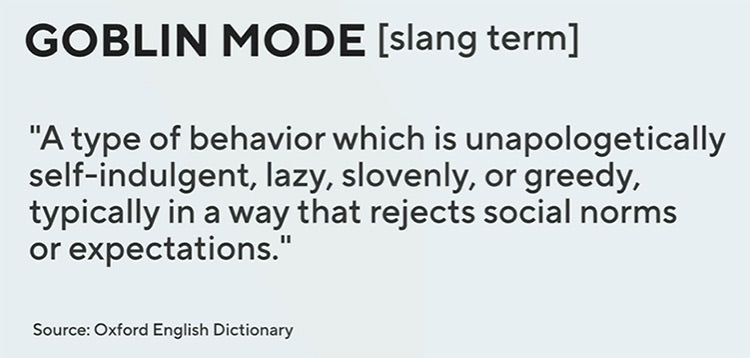Beating out many other words in a fierce competition, “Goblin Mode” has been announced as Oxford English Dictionary’s Word of the Year. This may come as a surprise to the vast majority of people who may both be unfamiliar with the term and unaware that such a competition exists.
The competition is no laughing matter. 318,956 people participated in the open poll, and “Goblin Mode” destroyed the competition of “#IStandWith” and “Metaverse.” The amount of engagement with the poll was not expected by Oxford English Dictionary. In a press release, President of Oxford Languages Casper Grathwohl stated that “this level of engagement with the campaign caught us totally by surprise.”
This is the first time the annual competition was opened to public voting, and clearly this served to bring previously untapped interest to the event. Previous recent Words of the Year include Vax, Climate Emergency, and Toxic.
But what does the expression mean, and where did it come from? Oxford defines it as: “a slang term, often used in the expressions ‘in goblin mode’ or ‘to go goblin mode’ – is ‘a type of behaviour which is unapologetically self-indulgent, lazy, slovenly, or greedy, typically in a way that rejects social norms or expectations.’” Basically, it’s a joke expression referring to that time when we want to stop trying so hard and enjoy some time as a couch potato.
The word is thought to have originated from a 2009 tweet and comedian Iliza Schlesinger has an adjacent concept with her “party goblin” bit dating back many years. But the phrase’s resurgence – and current usage in internet culture – came much later. A viral tweet from @JUNIPER is credited as bringing the word into whatever level of mainstream usage qualifies a word for Word of the Year.
no fucking way pic.twitter.com/7LnXGQfgeI
— pudding person (@JUNlPER) February 15, 2022
This is not the first “joke” word to end up with a surprising level of legitimacy. Homer Simpson’s famous catchphrase “D’oh” was adopted as a word in the Oxford English Dictionary back in 2001. And that’s not the only word to find its way from The Simpsons to the Dictionary. In 2018, Oxford English Dictionary announced that embiggen would be joining their ranks as well.
Alex Horne, a comedian who you might know best as the creator and host of the British comedy panel series Taskmaster, wrote the 2010 book Wordwatching about his comedic and genuine attempt to enter a new word in the dictionary. He, like The Simpsons writer David X. Cohen before him, found lexicographical success. Honk, slang for money, is in the dictionary thanks to the comedian.
Comedians try their hardest to leave their impact on listeners, and good comedy has a way of getting passed around easily. Think about how many quotes from Monty Python or George Carlin have fused themselves into the public consciousness. So in a way, it’s unsurprising that our language evolves to fit funny words and phrases into it. Goblin Mode will not be the last.

